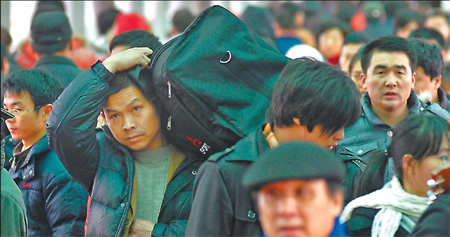
Passengers pour into the Beijing West Railway Station yesterday, the first day of the Spring Festival travel period. [China Daily]
New measure will be tested during Spring Festival travel
|
Passengers pour into the Beijing West Railway Station yesterday, the first day of the Spring Festival travel period. [China Daily] |
The Ministry of Railways may adopt a name-based train ticket system in the future, depending on travelers' responses to a trial operation at 37 railway stations this Spring Festival.
The ministry has drafted a plan of action and made technical preparations for adopting the disputed name-based system, Gao Xiaobing, publicity affairs director with the Ministry of Railways, told a press conference yesterday.
But whether the name-based system can stop scalpers and make tickets easier for travelers to get during the peak traffic season between Jan 30 and March 10 will still be wait and see, she said.
Some 100 million yuan has been spent to upgrade the ticket-selling systems at 37 railway stations in Guangdong, Sichuan and Guizhou provinces and Chongqing municipality, according to ministry spokesman Wang Yongping.
Passengers need to show identification when buying train tickets at these railway stations, and each passenger can buy no more than three tickets. ID information will be printed on the ticket, and passengers need to present both ID and the ticket to get on the train.
The other measures include firing employees who help scalpers, and looking into the responsibility of officials whose departments are found to be involved in scalping due to poor management or dereliction of duty. The worst could face dismissal, she said.
A website, 12306.cn, will also be opened during peak traffic, providing information on how many tickets are left for a specific train.
And a 24-hour hotline, 010-51843418, will be set up by the ministry to receive complaints.
The ministry forecast that 210 million railway trips will be made in the 40 days starting Jan 30, 9.5 percent higher than the same period last year.
Many people will face ticket shortages, massive crowds and possible weather difficulties as they try to get home for next month's Lunar New Year, which falls on Feb 14 this year, coinciding with Valentine's Day.
Spokesman Wang said the name-based train ticket system may not be a good solution to ticket shortages.
"The name-based train ticket system will not add one more ticket. Whether it could stop scalpers is unknown. But, it will cost passengers time," he said.
However, a majority of the public does not agree.
An online survey of some 5,000 netizens by China Youth Daily last week showed over 85 percent believe the name-based train ticket system could help curb scalpers.
Only 10 percent didn't think the new system would affect the scalpers' prosperous businesses.
Yan Weijie, a migrant worker from Anyang, Henan province, said: "Selling name-based tickets sounds like a good idea to me. I think there will be fewer scalpers soon."
But Meng Xiangxing, a student at Beijing Foreign Studies University from Jinan, capital of Shandong province, said he was worried that scalpers might have new ways to sneak around the rules.
"It looks to me that the scalpers have a pretty mature industrial structure. You know, they have the insiders and everything," he said.
He believed the main reason for the difficulty in getting tickets is transportation capacity.
"If there were enough tickets for everybody in the first place, why would there be scalpers at all?" he said.
Director Gao said the solution to the difficulty of buying train tickets is to speed up the development of China's railways.
China is expected to have 26,000 km of new rail lines put into operation between now and 2012, bringing the total length to 110,000 km.
Train tickets in regions like the Yangtze River Delta and Bohai Bay will be easier to get by 2012, thanks to the completion of intercity passenger railways, she said.
But the ticket shortage across the country won't be solved until 2020 when trunk lines link all the regions, she said.
A north-south high-speed trunk line between Beijing and Guangzhou is expected to be completed by 2012.
Spokesman Wang said when the high-speed Guangzhou-Shenzhen-Hong Kong railway is completed, travel time from Beijing to Hong Kong will be cut from the current 24 hours to eight hours. Travel time from Shanghai to Hong Kong will also be cut from 18 hours to only six hours.